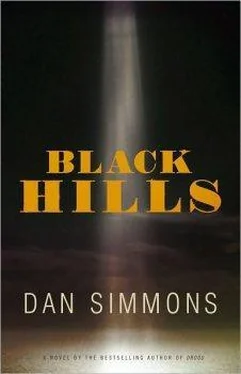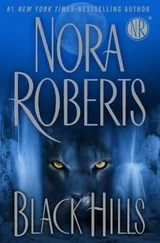— Grandfather, I have seen that Tasunke Witko intends to kill me.
Limps-a-Lot nods and sets his huge hand on Paha Sapa’s thin shoulder.
— I agree, Black Hills. I do not have your gift of forward- or inward-seeing, but I agree that Crazy Horse will kill you if you tell him that the wasichu will someday kill him and he will kill you if you say that they will not or even if you keep silent. He is certain that the ghost within you is Long Hair’s ghost, and Crazy Horse is afraid of it. He wants the ghost to die with you.
Paha Sapa is ashamed of his girlish tears earlier. Now he only feels empty and very young.
— What shall I do, Grandfather?
Limps-a-Lot leads him out of the tipi. Hundreds of broad strides away, the northernmost campfires of the village glow. A dog barks. Two young men on guard duty out among the horses grazing across the stream call softly to each other. An owl hoots in a cottonwood along that stream. Low clouds have moved in like a gray blanket to hide the moon and stars. Thunder continues to rumble from the south, but no rain has fallen yet. It is very hot.
Paha Sapa realizes that there are two horses standing there in the dark. One is Limps-a-Lot’s favorite, the good-running roan he calls Worm, and the other is the broad-backed white mare belonging to Three Buffalo Woman. That mare is now piled high with carefully tied robes and gear, and Worm has Paha Sapa’s own blanket, bow, quiver of arrows, lance, and other items on his back.
Limps-a-Lot points to the south.
— You must leave tonight and take Worm and the mare that Three Buffalo Woman calls Pehánska. You are to ride itokagata, south, past Bear Butte to the Black Hills. Go all the way into the Black Hills, deep into them, but travel with care—Crazy Horse’s and Angry Badger’s scouts say that white men have poured into our sacred hills during the past few moons and even built new cities there. Crazy Horse has vowed before everyone to go to the Paha Sapa next week and to kill every wasichu he finds there.
— Grandfather, if Crazy Horse and his warriors are going to the Black Hills soon, why are you sending me there? Would I not be safer if I rode north, toward Grandmother’s Country?
— You would be, and I will tell Crazy Horse that I loaned you my horses so that you could go to Grandmother’s Country.
— He will kill you for helping me , Tunkašila.
Limps-a-Lot grunts and shakes his head.
— No, he will not. It would set the bands to fighting, and Crazy Horse wants to kill wasichus by the thousand this year, not other Lakota. Not yet. And you must go to the Black Hills because there you must have your hanblečeya…. Your Vision must come to you there and nowhere else. This I know. Do you remember all that I have taught you about purifying yourself, building the sweat lodge, and singing to the Six Grandfathers?
— I remember, Grandfather. When may I return?
— Not until after your successful hanblečeya, Paha Sapa, even if that takes weeks or months. And in both going south and coming back north, travel carefully—keep the horses off ridgelines, hide in willows and streambeds when you can, act as if you are in the middle of Pawnee country. Both Crazy Horse and the wasichus will kill you on sight. Our village will be somewhere between Slim Buttes and Arikara country to the north, but be careful even to the coming in when you return…. Hide and observe the village for a day and a night and a day to be sure it is safe.
— Yes, Grandfather.
— Now go.
Limps-a-Lot swings the boy up and onto the back of Worm and hands him the hide rope for Pehánska , White Crane. The holy man peers into the midnight-black south.
— I think it will begin storming tonight and rain for many days. This is good. It will be very hard for Crazy Horse to track you, and he was never that good a tracker. But head west to where the stream runs south from Slim Buttes and stay in the river for as many hours as you can, then try to stay on the hard, rocky land. Hide during the day if you have to. Good-bye, Paha Sapa.
— Good-bye, Grandfather.
— Toksha ake čante ista wacinyanktin ktelo, Paha Sapa.
I shall see you again with the eye of my heart.
Limps-a-Lot turns and walks as quickly as he can back to the lighted village. Clucking the horses into silence, Paha Sapa turns their heads southwest and rides into the night.
Chapter 10 George Armstrong Custer

Libbie, my dearest .
I have been lying here in the healing darkness thinking about how you looked that first time I met you—formally met you, since I had seen you as a little girl and even worshipped you from afar years before in Monroe—in 1862 at that Thanksgiving party at the girls’ finishing school. Your dark hair, all in perfectly formed ringlets, fell down over your bare shoulders that night. Your pale face and exposed skin glowed like ivory in the candlelight. I remember how I was stunned by the dark slashes of your eyebrows above your daunting, expressive eyes, and by how even your slightest and most demure of smiles brought out those dimples. You were twenty-one years old that autumn, and your body had ripened far from the stick-figure girl in the blue pinafore I had glimpsed on Monroe’s main streets in earlier years. The gown you wore that night to the Thanksgiving party was cut low enough for me to see your ample bosom. I could have set my hands fully around your slim waist and felt my fingertips touch.
Do you remember last autumn, when we spent our leave from Fort Abraham Lincoln in New York? We were so poor—in all my years of service and, some might say, of fame, I have never chosen to profit from my service to my country—so poor that we had to stay at the dreadful boardinghouse and take the freezing, drafty horsecars to the various receptions and dinners to which we were invited because we had no money for a cab. I had my one civilian suit. Only one. You had several lovely dresses for those balls and receptions, but they were dresses you had used and mended and made small changes on for many seasons and carried back and forth in your trunk across the prairie and continent with you many times.
You remember that forty times that cold autumn and colder winter in New York we went to see Julius Caesar performed, not because either of us liked the play that much—I grew to despise it—but because the actor and our friend Lawrence Barrett always left two complimentary tickets for us whenever he appeared. We suffered Julius Caesar forty times those cold months because it was free and gave us an excuse to leave the loud, crowded, food-smelling boardinghouse.
But do you also remember that December when, on a rare quiet night in our boardinghouse room when everyone but us seemed gone from the place, you and I lay in bed and talked about how we wished we had actually met when we were both children?
“What would you have done with me if you’d known me when I was a wee maiden?” you asked.
“Seduced you,” I whispered. “Made love to you at once.”
And then, you remember, my darling, you asked me to shave away your glorious thatch of black hair there, using my campaign razor and the hotel shaving soap. And you remember how I lit the extra candle and set the small mirror—at your request—so that you could watch the transformation even as it took place. Oh, how you trusted me, my darling. And how you shuddered and blushed when I kissed your now pale and hairless mons and continued kissing lower.
Читать дальше













